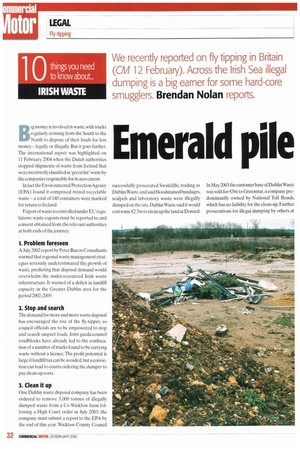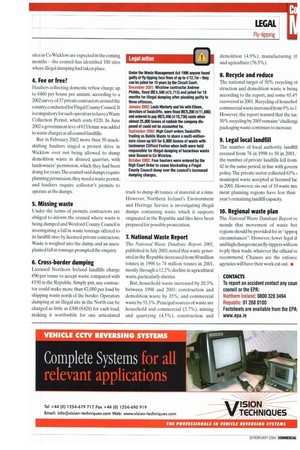Emerald pile
Page 32

Page 33

If you've noticed an error in this article please click here to report it so we can fix it.
Big money is involved in waste, with trucks regularly crossing from the South to the North to dispose of their loads for less money — legally or illegally. But it goes further. The international aspect was highlighted on 11 February 2004 when the Dutch authorities stopped shipments of waste from Ireland that were incorrectly classified as green list' waste by the companies responsible for its movement.
In fact the Environmental Protection Agency (EPA) found it comprised mixed recyclable waste — a total of 140 containers were marked for return to Ireland.
Export of waste is controlled under EU regulations: waste exports must be reported to, and consent obtained from, the relevant authorities at both ends of the journey.
I. Problem foreseen
A July 2002 report by Peter Bacon Consultants warned that regional waste management strategies seriously underestimated the growth of waste, predicting that disposal demand would overwhelm the under-resourced Irish waste infrastructure. It warned of a deficit in landfill capacity in the Greater Dublin area for the period 2002-2009.
2. Stop and search The demand for more and more waste disposal has encouraged the rise of the fly-tipper, so council officials are to be empowered to stop and search suspect loads. Joint gardaicouncil roadblocks have already led to the confiscation of a number of trucks found to be carrying waste without a licence. The profit potential is large if landfill tax can be avoided, but a conviction can lead to courts ordering the dumper to pay clean-up costs.
3. Clean it up One Dublin waste disposal company has been ordered to remove 5.000 tonnes of illegally dumped waste from a Co Wicklow farm following a High Court order in July 2003; the company must submit a report to the EPA by the end of this year. Wicklow County Council successfully prosecuted Swalcliffe. trading as Dublin Waste, and said bloodstained bandages, scalpels and laboratory waste were illegally dumped on the site. Dublin Waste said it would cost some€.2.5m to clean up the land at Donard. In May 2003 the customer base of Dublin Waste was sold for €5m to Greenstar, a company predominantly owned by National Toll Roads, which has no liability for the clean-up. Further prosecutions for illegal dumping by others at sites in Co Wicklow are expected in the coming months — the council has identified 100 sites where illegal dumping had taken place.
4. Fee or free?
Hauliers collecting domestic refuse charge up to €400 per house per annum, according to a 2002 survey of 37 private contractors around the countryconducted for Fmgal County Council. It is compulsory for such operators to have a Waste Collection Permit, which costs €120. In June 2002 a government levy of €15/tonne was added to waste charges at all council landfills.
But in February 2002 more than 50 muckshifting hauliers staged a protest drive in Wicklow over not being allowed to dump demolition waste in disused quarries, with landowners' permission, which they had been doing for years.The council said dumps require planning permission; they need a waste permit, and hauliers require collector's permits to operate at the dumps.
5. Missing waste
Under the terms of permits. contractors are obliged to inform the council where waste is being dumped and Wexford County Council is investigating a fall in waste tonnage offered to its landfill sites by licensed private contractors. Waste is weighed into the dump, and an unexplained fall in tonnage prompted the enquiry
6. Cross-border dumping
Licensed Northern Ireland landfills charge €90 per tonne to accept waste, compared with €150 in the Republic. Simply put, any contractor could make more than €2,000 per load by shipping waste north of the border. Operators dumping at an illegal site in the North can be charged as little as £300 (€420) for each load, making it worthwhile for one articulated truck to dump 40 tonnes of material at a time. However. Northern Ireland's Environment and Heritage Service is investigating illegal dumps containing waste which it suspects originated in the Republic and files have been prepared for possible prosecution.
7. National Waste Report
The National Waste Database Report 2001, published in July 2003, noted that waste generated in the Republic decreased from 80 million tonnes in 1998 to 74 million tonnes in 2001, mostly through a 12.2% decline in agricultural waste, particularly slurries.
But, household waste increased by 20.3% between 1998 and 2001; construction and demolition waste by 35%; and commercial waste by 53.3%. Principal sources of waste are household and commercial (3,7%), mining and quarrying (4.5%), construction and demolition (4.9%), manufacturing (6 and agriculture (76.5%).
8. Recycle and reduce The national target of 50% recycling of struction and demolition waste is being according to the report, and some 65.4°, recovered in 2001. Recycling of househol commercial waste increased from 9% to 1. However, the report warned that the tar; 50% recycling by 2005 remains "challengi packaging waste continues to increase.
9. Legal local landfill The number of local authority landfill creased from 76 in 1998 to 50 in 2001, the number of private landfills fell from 42 in the same period, in line with govern policy The private sector collected 63% I municipal waste accepted at licensed fac in 2001. However, six out of 10 waste ma ment planning regions have less than year's remaining landfill capacity.
M. Regional waste plan
The National Waste Database Report re mends that movement of waste bet regions should be provided for in "appror circumstances". However, fewer legal dT and high charges mean fly-tippers will con to ply their trade, whatever the official re recommend. Chances are the enforce agencies will have their work cut out. • CONTACTS To report an accident contact any coun council or the EPA: Northern Ireland: 0800 328 3494 Republic: 01 268 0100 Factsheets are available from the EPA; e pa. le






























































































































































































